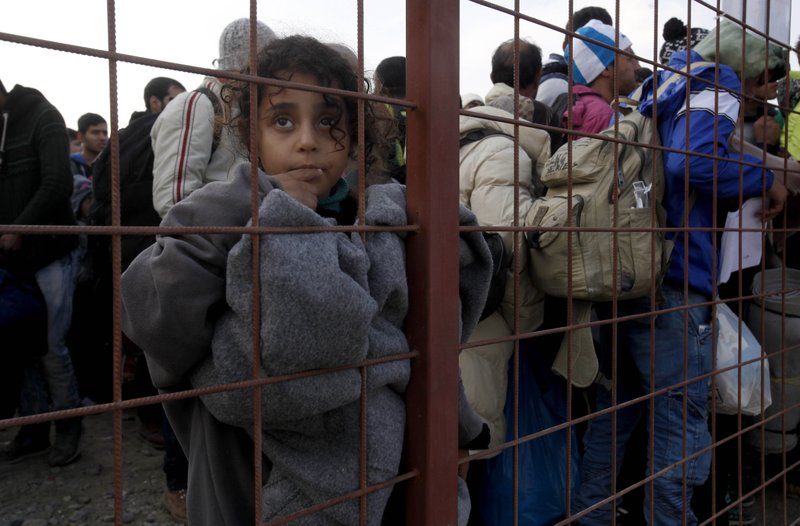BERLIN -- The news that one of the assailants in the Paris attacks may have crossed into Europe with migrants fleeing Syria is raising the debate over Europe's immigration policy to a new pitch.
German Chancellor Angela Merkel, already under pressure from political foes and allies, seemed Saturday to hold on to her stance of placing no limits on the number of people Germany is willing to give refuge to -- a stance that is increasingly being called into question.
In a somber statement hours after the attacks, she urged her countrymen to uphold European values of humanity and compassion in the face of terrorism.
"We believe," she said, "in the right of every person to seek happiness and to enjoy it, in the respect for others and in tolerance."
But her optimism, reflected in Merkel's signature phrase that "we will manage it," is being met with growing skepticism in Germany and abroad, and not just by those on the far right who have long opposed immigration.
Police in Berlin blocked off the square in front of the French Embassy, steps away from the Brandenburg Gate and the Reichstag parliament building, as Merkel summoned her security Cabinet for an emergency meeting to discuss Germany's response to the attacks.
In Italy, one of the two main points of arrival for migrants fleeing to Europe, Prime Minister Matteo Renzi met with intelligence and security officials in Rome and said security would be tightened nationwide.
Even before Friday's attacks in Paris, Finance Minister Wolfgang Schaeuble, a close Merkel ally, compared the more than 750,000 migrants who have arrived in Germany this year to an avalanche. His words reflect fears not just about how long the country of 80 million can keep up its open-door policy, but also about a possible violent backlash.
The country has already seen a surge in attacks against migrants and refugee shelters. So far this year authorities have recorded 689 such attacks -- more than three times the number for all of 2014.
Far-right extremists are behind much of the organized incitement, and have carried out some of the most high-profile attacks, including the one on Cologne mayoral candidate Henriette Reker. She was stabbed in the neck while campaigning in mid-October by a man who said he wanted to take a stand against migrants. Reker, who won the election, had been in charge of housing migrants in the western city.
Thomas de Maiziere, the country's interior minister, told reporters Saturday after the attacks in Paris that German security agencies were keeping a close eye not only on Islamic extremists "but also the far-right extremists who might react to such an attack."
But Germany's top security official also warned that two-thirds of suspects linked to attacks on migrants and asylum homes were previously unknown to the police.
Sensitive to the growing misgivings among many Germans about how their country can cope with the sheer number of migrants, the government recently agreed on measures to quickly process those who stand little chance of getting asylum, vetting more people at the border, and distributing migrants across Europe.
Even for some of Merkel's allies, such efforts don't go far enough.
Markus Soeder, a member of Bavaria's regional government, called Saturday for still greater efforts to ensure that authorities know who is entering the country. In an interview with the weekly Welt am Sonntag, Soeder insisted "the days of unchecked immigration and illegal entry can't continue. Paris changes everything."
His warning came as a Greek official said a Syrian passport was found at the scene of one of the Paris attacks. The passport, found next to the corpse of an attacker, was recorded Oct. 3 by Greek officials on the island of Leros, Deputy Citizen Protection Minister Nikos Toskas said in a statement. Toskas said he didn't know whether the passport was later processed by authorities elsewhere in Europe.
On Saturday, Poland's incoming minister for European affairs said his country couldn't go ahead with EU decisions on immigration and accept refugees without guarantees of security.
"In the wake of the tragic events in Paris, Poland doesn't see the political possibilities to implement a decision on the relocation of refugees," Konrad Szymanski was quoted Saturday as saying on Wpolityce.pl website. "The attacks mean there's a need for an even deeper revision of the European policy regarding the migrant crisis."
"This is a key condition that today was put under a giant question mark in all of Europe," Szymanski said.
Poland's previous Cabinet, led by the Civic Platform party, also opposed efforts led by Merkel to force EU member states to take in more migrants. While incoming Foreign Minister Witold Waszczykowski said Poland will meet a commitment by the Civic Platform to shelter 7,000 refugees, prime minister designate Beata Szydlo referred to the deal as "blackmail." She will be sworn in Monday.
Marine Le Pen, leader of France's National Front party, called for authorities to expel migrants who are in the country illegally.
Asylum seekers fleeing war and poverty in Syria and other war-ravaged countries condemned the Paris attacks, saying they feared it may become more difficult to start new lives in western Europe.
Abdul Selam, 31, who was fleeing Syria, said he fears migrants now "will be considered as probable attackers."
Information for this article was contributed by Frank Jordans, Eldar Emric and Demetri Nellas of The Associated Press and by Arne Delfs, Birgit Jennen, Tony Czuczka and Piotr Bujnicki of Bloomberg News.
A Section on 11/15/2015

